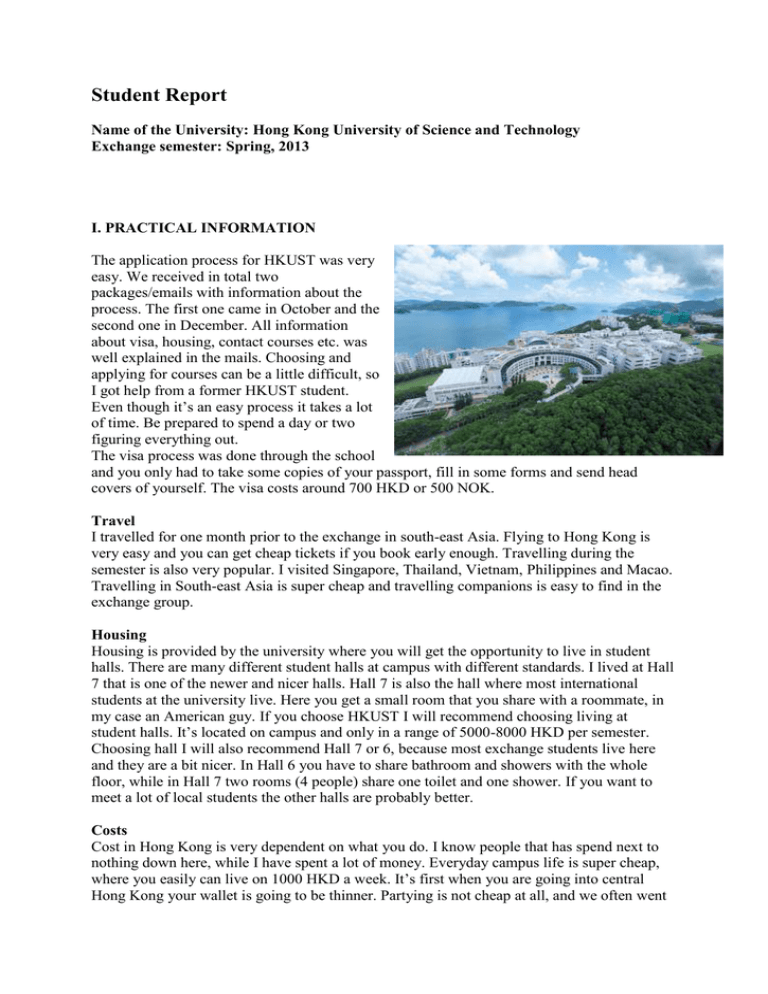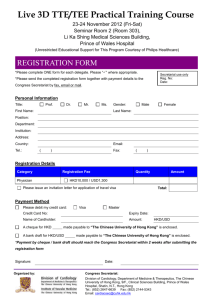Student Report
advertisement

Student Report Name of the University: Hong Kong University of Science and Technology Exchange semester: Spring, 2013 I. PRACTICAL INFORMATION The application process for HKUST was very easy. We received in total two packages/emails with information about the process. The first one came in October and the second one in December. All information about visa, housing, contact courses etc. was well explained in the mails. Choosing and applying for courses can be a little difficult, so I got help from a former HKUST student. Even though it’s an easy process it takes a lot of time. Be prepared to spend a day or two figuring everything out. The visa process was done through the school and you only had to take some copies of your passport, fill in some forms and send head covers of yourself. The visa costs around 700 HKD or 500 NOK. Travel I travelled for one month prior to the exchange in south-east Asia. Flying to Hong Kong is very easy and you can get cheap tickets if you book early enough. Travelling during the semester is also very popular. I visited Singapore, Thailand, Vietnam, Philippines and Macao. Travelling in South-east Asia is super cheap and travelling companions is easy to find in the exchange group. Housing Housing is provided by the university where you will get the opportunity to live in student halls. There are many different student halls at campus with different standards. I lived at Hall 7 that is one of the newer and nicer halls. Hall 7 is also the hall where most international students at the university live. Here you get a small room that you share with a roommate, in my case an American guy. If you choose HKUST I will recommend choosing living at student halls. It’s located on campus and only in a range of 5000-8000 HKD per semester. Choosing hall I will also recommend Hall 7 or 6, because most exchange students live here and they are a bit nicer. In Hall 6 you have to share bathroom and showers with the whole floor, while in Hall 7 two rooms (4 people) share one toilet and one shower. If you want to meet a lot of local students the other halls are probably better. Costs Cost in Hong Kong is very dependent on what you do. I know people that has spend next to nothing down here, while I have spent a lot of money. Everyday campus life is super cheap, where you easily can live on 1000 HKD a week. It’s first when you are going into central Hong Kong your wallet is going to be thinner. Partying is not cheap at all, and we often went out 2-3 times a week. Eating out on non-Chinese restaurants is also expensive, where you can compare prices to Norwegian standards. Rent at school is between 5000-8000 HKD, depending on which hall you chose. Books are cheap and in most classes they don’t use books but only power points. So I spend 200 HKD on books. Food I spent around 1000 HKD a week if I just ate at campus. If I went out eating a couple of nights you can add 500 HKD. Transport in Hong Kong is very easy and cheap. You have an octopus card that you can use on every form for transportation. Normal ride into the city from campus is 15 HKD. Other expenses are hard to say how much I have used. A lot has gone when I have been travelling and a lot has been used partying. II. ABOUT THE SCHOOL The school is situated in Clearwater Bay, 30 min cab drive from Central Hong Kong. The surroundings of the school are magnificent with beautiful landscape and the ocean. You don’t feel like you are in one of the biggest cities in the world studying at this school. The school consists of academic buildings and a lot of housing buildings. The academic buildings lie on top of the hill, while all the student halls are situated in the hillside. Down by the ocean you will find nice beach areas, indoor and outdoor swimming pools, a big artificial soccer pitch, a smaller soccer pitch, basketball courts etc. The school different divisions are business, science and technology. The study structure is very similar to American Universities where you take a 4-year bachelor. Course registration The registration of courses will you do online prior to arrival. This can be a little tricky, and you should know which course you want before the process starts. When school starts there is a 2 week add/drop period, where you can change classes if you don’t like the ones you have. The most popular classes is difficult to get in the add/drop period because they are often full. Academic calendar Arrival date: First day of the semester: Last day of classes: Examination period: Any special events/holidays: Other: 25.01.13 01.02.2013 16.05.2013 30.05.2013 Chinese New Year, Spring break In spring semester there are a lot of free days Arrival When you arrive HK it is pretty normal that your buddy will meet you at the airport, if this is something you want. Checking in at school and your dorm is also very easy. Sadly isn’t there an introduction week like we are used to in Norway, but the exchange students have a lot of fun together. The only thing the school provides is a culture tour around the city one of the days. If you have any worries you can speak with your contact person at campus, and they will help you. They were very helpful towards me. To promote BI and Norway in our stay we participated on the exchange fair at school. Social activities In social activities you definitely get the best relationship with other exchange students and international full-time students at the school. It’s difficult to get to know local students on a personal level, because they are very shy and extremely committed to school. While for westerner student’s university-life is very much about social life and probably a little less on school, this is not the case in Hong Kong. The relationship to other exchange students was great and we had a lot of fun together. There are a lot of student organizations at the school, but most communication in these organisations is in Cantonese. III. ACADEMICS Hong Kong University of Science and Technology is much known for its academics and is regarded as one of the best business schools in Asia. Everything from teachers to course material was top class. The way school works is very similar to high school in Norway or how Universities are in America. Everything was in English, so this was not a problem. I won’t say that it was much tougher then BI, but just very different. We only have one exam in each subject each semester that is 100% of your grad while in HK you get evaluated all the time. The workload isn’t that much more than BI, but you can’t decide when in the semester you want to do it. Relationship professor-student is one unique thing in this university, where you really can get to know your professor. The relationship with other students is also good, but it can also get a little ugly some times because of the competition for the best grades. We only used book in one of our classes in HK. Most teachers prefer that you use their power points instead. They will also provide a lot of extra material if you are interested in reading more about the subjects. All course material is in English. Mandatory course material is much less than what you are used to in BI where you always have a big book in each subject. The grading system at HKUST is everything from presentations, case studies, group homework, in-class participation, in-class quizzes, participation on-line, mid-terms and finals. This depends very on which class you choose. Many of the management/marketing classes have group assignments, but no final exam. These classes have a steady work load through the semester. Finance, accounting, operations, economics classes often emphasize more on the midterm and final exam. What kind of grading process depends very on the courses you choose. Library and technology Library facilities at the school are excellent. You have one main library where one of the floors never closes. Top floor of the library you have a lot of computers to use. There is also one printing/computer room that is packed with computers. The school have both Bloomberg and Reuter’s terminals. Course code & name Example:FIN123 Finance MGMT 3040 ISOM 2700 FINA 3104 FINA 3304 Master/ Bachelor Bachelor B B B B Exam form Prerequisites 4-hour written exam 2 hour exam 3 hour exam 3 hour exam None None Approved as Elective ORG None Finans 1 None Elective Mandatory Elective Elective Comments






